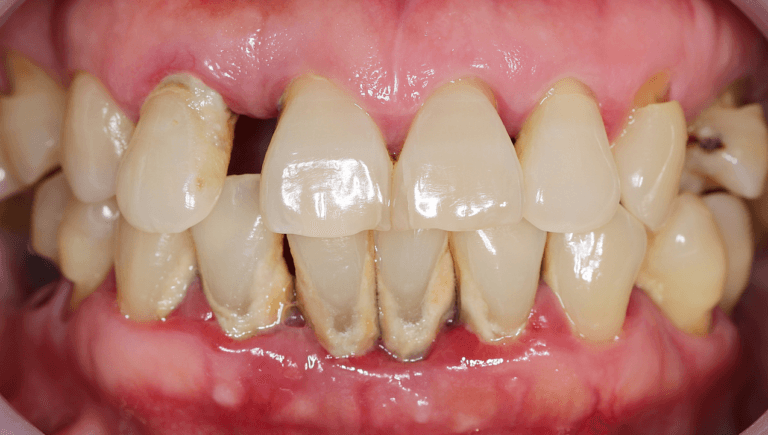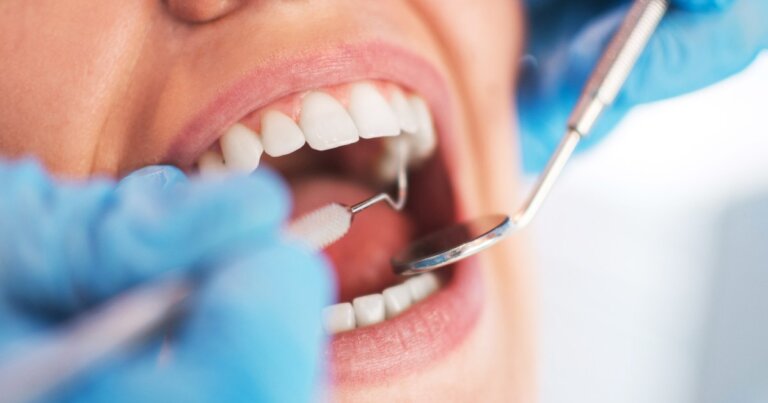Dental Plaque

What Is Dental Plaque?
Dental plaque is a sticky, colorless film that forms on the surface of teeth and gums. It is made up of bacteria and food particles that combine to create a soft biofilm that adheres to the teeth. If left untreated, dental plaque will harden over time to become dental calculus or tartar. It can also lead to tooth decay and gum disease.
Plaque buildup is a common problem, and it can be caused by poor oral hygiene habits, such as not brushing or flossing regularly. Other factors that can contribute to plaque formation include a diet high in sugar and carbohydrates, smoking, and certain medications.
Before you contact a Toronto dentist to examine the presence of Dental Plaque in your mouth, there are some things you should know as a patient:
- What Causes Dental Plaque?
- Signs And Symptoms Of Dental Plaque
- Treatment Options For Dental Plaque
- How To Prevent Dental Plaque
- Managing Dental Plaque Until You Can See The Dentist
- Frequently Asked Questions About Dental Plaque
If you have questions about Dental Plaque or other dental problems, please contact us for more information.
What Causes Dental Plaque?
Plaque buildup happens when bacteria in the mouth interact with leftover food particles. Factors that increase plaque formation include:
- Poor Oral Hygiene: Infrequent brushing and flossing allow plaque to accumulate.
- Diet High in Sugars and Starches: These foods fuel bacteria growth, encouraging plaque.
- Dry Mouth: Saliva helps wash away bacteria, so a dry mouth can lead to more plaque buildup.
- Medications: Certain medications can cause dry mouth, increasing plaque risk.
- Genetics: Some people are genetically predisposed to plaque and gum issues.
- Smoking: Tobacco use dries the mouth and reduces blood flow to gums, promoting plaque.
Even with good hygiene habits, plaque formation is natural, making regular dental checkups essential for its control. If you have further questions about Dental Plaque, please contact us.
Signs and Symptoms of Dental Plaque
Though often invisible, plaque can still be detected through symptoms like:
- Bad Breath: The bacteria in plaque produce unpleasant odors.
- Tooth Discoloration: Plaque can cause yellow or brown staining.
- Increased Sensitivity: Plaque erodes enamel, leading to sensitivity to hot, cold, or sweet foods.
- Gum Swelling and Inflammation: Plaque buildup near the gumline can cause swelling, redness, and bleeding.
- Cavities and Gum Disease: Untreated plaque can cause decay and gum disease, leading to gum recession, bone loss, and tooth loss.
These symptoms underscore the importance of regular cleanings to manage plaque and prevent complications. If you have further questions about the signs and symptoms of Dental Plaque, please contact us.
Treatment Options for Dental Plaque
If left untreated, dental plaque can lead to gum disease and tooth decay. Professional teeth cleanings allow dental professionals to use specialized tools to remove stubborn plaque. Maintaining preventive practices such as brushing, flossing, and scheduling regular checkups can keep plaque under control and prevent complications. If you have further questions about treatment options for Dental Plaque, please contact us.

How to Prevent Dental Plaque
Effective prevention of dental plaque requires a consistent oral care routine. Here are some proven methods to minimize plaque buildup:
- Brush Twice Daily: Brush for two minutes, twice a day, with a fluoride toothpaste to remove plaque effectively. We recommend a soft-bristle toothbrush, like the Curaprox CS5460 Ultra Soft Swiss Toothbrush, or an electric option like the Philips Sonicare ProtectiveClean 6100.
- Floss Daily: Flossing removes plaque and food particles from between the teeth and along the gumline. Explore our dental floss guide for helpful tips.
- Use Tartar-Control Toothpaste: Toothpaste with tartar-control properties, such as Crest Pro Health Gum Detoxify Deep Clean, helps prevent plaque buildup by neutralizing bacteria and supporting gum health.
- Rinse with Antiseptic Mouthwash: An antiseptic mouthwash, like Crest Gum Care Mouthwash, can kill bacteria responsible for plaque formation and freshen breath.
- Use a Water Flosser: A water flosser, such as the Waterpik Aquarius, effectively cleans between teeth and along the gumline, helping prevent plaque.
- Avoid Tobacco: Smoking increases plaque formation and other oral health issues, so quitting can help improve your dental and overall health.
- Limit Sugary and Starchy Foods: Sugars and starches fuel bacteria growth, so limiting these foods and opting for fruits, vegetables, and whole grains can benefit oral health.
- Stay Hydrated: Drinking plenty of water helps wash away food particles and bacteria that contribute to plaque.
- Visit Your Dentist Regularly: Professional dental cleanings help remove plaque in hard-to-reach areas and catch potential issues early.
Adopting these practices can significantly reduce plaque buildup and support long-term oral health. For more information about how to prevent Dental Plaque buildup, please contact us.
Frequently Asked Questions About Dental Plaque
If you’re waiting for a professional cleaning, follow these at-home steps to minimize plaque:
- Brush and Floss Daily: Use a tartar-control toothpaste and consider adding a water flosser.
- Quit Smoking: This can reduce your risk of plaque buildup and improve your overall health.
- Choose a Healthy Diet: Limit sugars and starches, drink plenty of water, and eat fresh fruits, vegetables, and whole grains.
- Chew Sugar-Free Gum: Gum stimulates saliva production, which helps wash away particles and bacteria after meals.
For more guidance on managing dental plaque or scheduling a professional cleaning, contact our team. Regular oral hygiene and preventive dental care are the best defense against dental plaque and the issues it can cause. If you have further questions about Dental Plaque management at home, please contact us.
Managing Dental Plaque Until You Can See the Dentist
- How does dental plaque form?
Plaque develops when bacteria in the mouth mix with sugary or starchy foods, producing acids that combine with saliva to create the sticky film adhering to teeth.
- Are there specific foods that contribute to plaque formation?
Yes, foods high in sugars and starches, like candy, soda, and bread, can promote plaque development.
- How does plaque lead to cavities?
The acids produced by plaque bacteria erode tooth enamel, creating holes or cavities.
- Is plaque the same as tartar?
No, plaque is a soft, sticky film, while tartar is hardened plaque that has calcified on teeth.
Preventing dental plaque through proper oral hygiene and regular dental visits is key to maintaining a healthy smile. If you have further questions about Dental Plaque management at home, please contact us.

